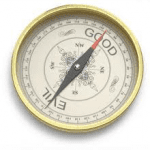Growing up, I thought that the capacity for spirituality was a rare and special gift, like musical genius or natural charm. I knew only one person who seemed to have it: my parents' friend Ned, an Irish poet who regularly went off to meditate with the Trappists and volunteer at the Catholic Worker's soup kitchen on New York's lower east side. People like Ned, I thought, had been born with an ability to experience the mystical underpinnings of things, to feel oneness with others, to be nice all the time. The rest of us were stuck with our basic ordinariness and selfishness, though like piano students stumbling through the scales, we could work at being spiritual, doing our best to act 'as if' we actually felt agape, spiritual love, or trying to sense a connection with the sacred.
Then, in my 20s, I had my first conscious openings into expanded awareness, and decided, with some self-satisfaction, that I must be one of those spiritually intelligent people. After all, I had experiences in which (for at least a few hours at a time) I felt love for all beings, in which I 'saw' lights moving in my inner body, in which I became the witness of my own mental processes. The confusing part, however, was that these experiences didn't seem to make me less angry, or more compassionate, or less prone to make judgments about myself and others. In fact, it took years, and a great deal of what is sometimes called inner work, for my character to begin to catch up to my spiritual insight. It was the humbling experience of learning how to close that gap that made me question my own assumptions about what it means to be spiritually gifted, or spiritually intelligent.
We use the word 'spiritual' to refer to a range of interests and traits, from having faith in a higher power, to channeling messages from dead people, to practicing yoga and meditation, to sensing our kinship with all life, all the way to the state of oneness with God. And as for assessing it—well, we know that the Dalai Lama is spiritual, but what about the girl you met at the gym, who channels a being she claims is an ascended Himalayan master, and gives intuitive financial advice over the telephone? And what about your aunt, who never talks about God but who effortlessly extends kindness to everyone who comes into her orbit?
In fact, there are several reasons to be uncertain about what we mean by spiritual intelligence. Here's one reason for uncertainty: while spiritual experiences, insights, and states seem to be available to people of every age, culture, and moral/ethical condition, these experiences don't always translate into the way we live our lives. Philosopher Ken Wilber makes a useful distinction here between spiritual states, which come and go, and traits, qualities of character that appear only when these states have been integrated into our lives. An example of how this works would be Eric, who is an awesome energy healer, but who never sees his kids and is so shifty with money that his friends won't do business with him. Eric has no problem accessing high spiritual states; yet his level of ethical development is arrested somewhere in adolescence.
Wilber makes another very helpful point: the way we interpret our spiritual experiences, depends on our cultural and religious framework, and on our stage of social and ethical development. A prayerful Southern Baptist dreams of a brilliant light, and wakes up overwhelmed with love. He might then interpret the brilliance as the light of Christ, and take it as a sign to embark on an evangelical ministry. A jihadist could have the same dream and see it as divine confirmation of his desire to become a martyr by blowing himself up on a crowded bus. A follower of an Indian guru might interpret the experience as a glimpse of enlightenment, and decide to go live in an ashram for a few years, while a young woman in love might interpret the light and love as a signal that she has met her true soulmate. The conclusion that each of these people draws from their experience will determine how their spiritual insight affects their lives.
So, with these caveats, and acknowledging that a truly workable spirituality needs to be tempered with a good helping of practical common sense, ethical intelligence, and a willingness to question our assumptions, let me offer a working definition of spiritual intelligence as:
a) an ability to sense and connect to the presence of spirit/love/God in yourself, in others, and in the physical world;
b) access to feelings of compassion, to peace, and to insightful awareness;
c) a tendency to ask questions like "Who am I?" "Where am I going in my life?" and "What is the ultimate value of what I'm doing?"; and
d) a recognition of the interconnectedness of all life, and the realization that others' lives have the same value as your own.
Someone with a particularly high SQ (spirituality quotient) tends to be attentive to the presence of spirit (or, you might say, pure Beingness or love), not only during moments of meditation, in prayer, or in nature, but also at the breakfast table and in the middle of a family argument or a looming deadline. He will take responsibility for his own states of mind, and will tend to make choices that keep him in touch with spirit—choosing forgiveness over resentment, kindness over irritability, being willing to acknowledge that there can be different perspectives in situations. That tendency might not give her an easier life, but, in the long run, it will tend to make her wiser, kinder, and more peaceful in the face of loss and change.





